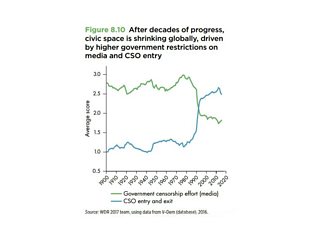What does the new World Development Report say?
Will Taylor
Senior Adviser (Governance and Rights), 主播大秀 Media Action
Tagged with:
Senior Governance Adviser Will Taylor reviews the World Development Report 2017.
There’s a lot to like in the , published earlier this week. , author of Working with the Grain, and DFID’s have already run through some of what it got right – and also identified areas for expansion.
Most importantly for us, it felt like an exciting and overdue breakthrough for media into the mainstream of governance debates in international development. The report references media more than 75 times, collating the increasingly extensive evidence base for media’s impact on governance.
Even more encouragingly, an independent and active media isn’t treated as a standalone issue, which only interests specialists removed from the hustle and bustle of 'real' governance work. Not only does media gets its own spotlight, it’s also well-integrated into the report as a whole.
To pick just a few quotes – media is described as an “indispensable component of citizen empowerment and collective action” and a “key actor” on transparency. It’s also said to play an “important role” in reshaping preferences and social norms within societies and a “central role” as an agent of accountability. The World Development Report (WDR) even argues that “access to media makes government more responsive to citizens’ needs.”
And yet, there were a couple of areas where I was left wanting more.
Protecting civic space, investing in quality journalism
Firstly, the report paints a depressing – if accurate – global picture of closing civic space, accompanied by increasing restrictions on media and civil society organisations (see Figure 8.10 from page 235 of the below).

In addition to these pressures from government, it must also be said that media organisations around the world are struggling financially. Traditional advertising models are no longer sufficient to maintain the independent, insightful and balanced journalism, which the report identifies as being so vital to accountable and responsive governance.
The report also notes the relative lack of funding for media by international development actors. Yet beyond a fairly vague reference to the possibilities of social media, there is no clarion call for greater focus, investment or strategy, which would both make elite capture of the media less likely and support quality journalism in the long-term.
A straight-laced report in a messy world
Secondly, while it included references to its 2015 predecessor – which explored how emotion, attitudes and norms affect development outcomes – this WDR feels more like it was written by an economist or engineer. It comes across as very ‘input, process, output’.
In contrast, the world of information is getting increasingly messy. We’re seeing a rapid fracturing of information sources, as well as the effects of the proliferation of echo chambers, erosion of trust and increasing polarisation of public debate. All this against the background of an in the shadows for control of the online world.
It’s great that the WDR has gathered such a lot of evidence that media, including social media, can affect the sharing of particular pieces of knowledge, stimulating people to take action. But increasingly the challenge is in how to support , which are rooted in facts, bridge divides between different societal groups and ensure that it’s not just the elites who can influence policy.
These are extremely challenging issues but, for media and governance, I’m increasingly convinced that they’ll be the focus of the next year’s debates. We’re looking forward to working with the World Bank and others to help the governance community deliver effective solutions.
is the lead adviser on 主播大秀 Media Action's Governance and Rights programming.
Over the next few months, 主播大秀 Media Action will release a series of research, practice and policy outputs addressing the difficult issues raised above.
Related content:
Report:
Blog:
Blog:
Blog:
